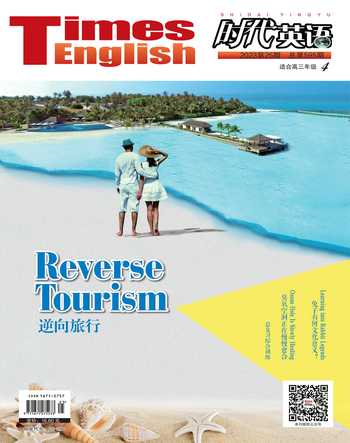Reverse Tourism逆向旅行
2023-09-17



Going against the tide of flocking to well-known yet generally jam-packed tourist destinations on vacation, a growing number of holidaymakers in China tend to spend their leisure time at lesser-known resorts to seek unique, relaxed holiday experiences. “Reverse tourism” has emerged as a new trend among young holidaymakers in China.
During a long public holiday, large numbers of vacationers, especially young professionals who want to escape from busy city life, avoid popular holiday destinations in order to get off the beaten track and enjoy some peace and quiet.
在中国,越来越多的度假者倾向于把闲暇时间花在不太知名的度假胜地,以寻求独特、轻松的度假体验,这与人们在度假时涌向知名但通常人满为患的旅游目的地的潮流相反。“逆向旅行”已成为中国年轻度假者中流行的一种新趋势。
在一个较长的公共假期中,大量的度假者,尤其是想要逃离繁忙城市生活的年轻职场人士,为了不走寻常路,享受一些闲适与宁静,而避开热门的度假目的地。
“Tourism used to be about sightseeing. Now it is about experiences,” Dai Bin, president of the China Tourism Academy, told Beijing Daily.
He said popular tourist spots are always packed and often raise their prices during holidays. As people become more mature travelers, they are increasingly unwilling to follow the herd. Some of them are simply looking to take a rest somewhere quiet for a couple of days, which is a good way to vacation, he noted.
In addition, lesser-known attractions are not as commercial and standardized as developed ones and are able to offer more authentic experiences and natural encounters, according to social media posts. And unlike popular destinations, some underexplored places with little online exposure can offer more surprises.
“过去旅游就是观光,而现在更重要的是体验。”中国旅游研究院院长戴斌在接受《北京日报》采访时表示。
他说,热门旅游景点总是爆满,而且经常在假期提价。随着人们成为更成熟的旅行者,他们越来越不愿意随大流。他指出,他们中的一些人只是想找个安静的地方休息几天,这是一种很好的度假方式。
此外,一些社交媒体的帖子称,不太知名的景点不像发达景点那样商业化和标准化,能够提供更真实的体验和自然的邂逅。与热门目的地不同的是,一些未被开发、很少在网上曝光的地方可以提供更多惊喜。
Word Bank
resort /r?'z??t/ n. 旅游胜地;度假胜地
follow the herd 跟風;随波逐流
They are individuals; they will not follow the herd.
